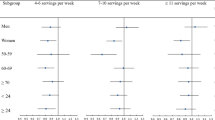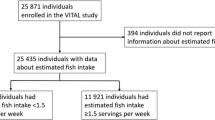Abstract
BACKGROUND/OBJECTIVES:
To provide a reliable assessment of the hypothesized association of fish consumption with stroke risk accumulatively, an updated meta-analysis of published prospective cohort studies was conducted.
SUBJECTS/METHODS:
Prospective cohort studies through April 2012 in peer-reviewed journals indexed in MEDLINE and EMBASE were selected. Additional information was retrieved through Google or a search of the reference list in relevant articles. The main outcome measure was the weighted hazards ratio (HR) and corresponding 95% confidence interval (CI) for incident stroke according to fish consumption using a random-effects model.
RESULTS:
A database was derived from 16 eligible studies (19 cohorts), including 402 127 individuals (10 568 incident cases) with an average 12.8 years of follow-up. Compared with those who never consumed fish or ate fish <1/month, the pooled adjusted HRs of total stroke risk were 0.97 (95% CI, 0.87–1.08), 0.86 (0.80–0.93), 0.91 (0.85–0.98) and 0.87 (0.79–0.96) for those who consumed fish 1–3/month, 1/week, 2–4/week and ⩾5/week, respectively (Plinear trend=0.09; Pnonlinear trend=0.02). Study location was a modifier. An inverse association between fish intake and stroke incidence was only found by studies conducted in North America. The modest inverse associations were more pronounced with ischemic stroke and were attenuated with hemorrhagic stroke.
CONCLUSIONS:
Accumulated evidence generated from this meta-analysis suggests that fish intake may have a protective effect against the risk of stroke, particularly ischemic stroke.
This is a preview of subscription content, access via your institution
Access options
Subscribe to this journal
Receive 12 print issues and online access
$259.00 per year
only $21.58 per issue
Buy this article
- Purchase on Springer Link
- Instant access to full article PDF
Prices may be subject to local taxes which are calculated during checkout



Similar content being viewed by others
References
He K, Song Y, Daviglus ML, Liu K, Van Horn L, Dyer AR et al. Fish consumption and incidence of stroke: a meta-analysis of cohort studies. Stroke 2004; 35: 1538–1542.
Bouzan C, Cohen JT, Connor WE, Kris-Etherton PM, Gray GM, Konig A et al. A quantitative analysis of fish consumption and stroke risk. Am J Prev Med 2005; 29: 347–352.
Larsson SC, Orsini N . Fish consumption and the risk of stroke: a dose-response meta-analysis. Stroke 2011; 42: 3621–3623.
Iso H, Rexrode KM, Stampfer MJ, Manson JE, Colditz GA, Speizer FE et al. Intake of fish and omega-3 fatty acids and risk of stroke in women. JAMA 2001; 285: 304–312.
He K, Rimm EB, Merchant A, Rosner BA, Stampfer MJ, Willett WC et al. Fish consumption and risk of stroke in men. JAMA 2002; 288: 3130–3136.
Folsom AR, Demissie Z . Fish intake, marine omega-3 fatty acids, and mortality in a cohort of postmenopausal women. Am J Epidemiol 2004; 160: 1005–1010.
Mozaffarian D, Longstreth WT, Lemaitre RN, Manolio TA, Kuller LH, Burke GL et al. Fish consumption and stroke risk in elderly individuals: the cardiovascular health study. Arch Intern Med 2005; 165: 200–206.
Nakamura Y, Ueshima H, Okamura T, Kadowaki T, Hayakawa T, Kita Y et al. Association between fish consumption and all-cause and cause-specific mortality in Japan: NIPPON DATA80, 1980-99. Am J Med 2005; 118: 239–245.
Myint PK, Welch AA, Bingham SA, Luben RN, Wareham NJ, Day NE et al. Habitual fish consumption and risk of incident stroke: the European Prospective Investigation into Cancer (EPIC)-Norfolk prospective population study. Public Health Nutr 2006; 9: 882–888.
Yamagishi K, Iso H, Date C, Fukui M, Wakai K, Kikuchi S et al. Fish, omega-3 polyunsaturated fatty acids, and mortality from cardiovascular diseases in a nationwide community-based cohort of Japanese men and women the JACC (Japan Collaborative Cohort Study for Evaluation of Cancer Risk) Study. J Am Coll Cardiol 2008; 52: 988–996.
Montonen J, Jarvinen R, Reunanen A, Knekt P . Fish consumption and the incidence of cerebrovascular disease. Br J Nutr 2009; 102: 750–756.
Larsson SC, Virtamo J, Wolk A . Fish consumption and risk of stroke in Swedish women. Am J Clin Nutr 2011; 93: 487–493.
de Goede J, Verschuren WM, Boer JM, Kromhout D, Geleijnse JM . Gender-specific associations of marine n-3 fatty acids and fish consumption with 10-year incidence of stroke. PLoS One 2012; 7: e33866.
Keli SO, Feskens EJ, Kromhout D . Fish consumption and risk of stroke. The Zutphen Study. Stroke 1994; 25: 328–332.
Morris MC, Manson JE, Rosner B, Buring JE, Willett WC, Hennekens CH . Fish consumption and cardiovascular disease in the physicians’ health study: a prospective study. Am J Epidemiol 1995; 142: 166–175.
Gillum RF, Mussolino ME, Madans JH . The relationship between fish consumption and stroke incidence. The NHANES I Epidemiologic Follow-up Study (National Health and Nutrition Examination Survey). Arch Intern Med 1996; 156: 537–542.
Orencia AJ, Daviglus ML, Dyer AR, Shekelle RB, Stamler J . Fish consumption and stroke in men. 30-year findings of the Chicago Western Electric Study. Stroke 1996; 27: 204–209.
Yuan JM, Ross RK, Gao YT, Yu MC . Fish and shellfish consumption in relation to death from myocardial infarction among men in Shanghai, China. Am J Epidemiol 2001; 154: 809–816.
Sauvaget C, Nagano J, Allen N, Grant EJ, Beral V . Intake of animal products and stroke mortality in the Hiroshima/Nagasaki Life Span Study. Int J Epidemiol 2003; 32: 536–543.
DerSimonian R, Laird N . Meta-analysis in clinical trials. Control Clin Trials 1986; 7: 177–188.
Egger M, Davey Smith G, Schneider M, Minder C . Bias in meta-analysis detected by a simple, graphical test. BMJ 1997; 315: 629–634.
He K . Fish, long-chain omega-3 polyunsaturated fatty acids and prevention of cardiovascular disease--eat fish or take fish oil supplement? Prog Cardiovasc Dis 2009; 52: 95–114.
Caicoya M . Fish consumption and stroke: a community case-control study in Asturias, Spain. Neuroepidemiology 2002; 21: 107–114.
Wennberg M, Bergdahl IA, Stegmayr B, Hallmans G, Lundh T, Skerfving S et al. Fish intake, mercury, long-chain n-3 polyunsaturated fatty acids and risk of stroke in northern Sweden. Br J Nutr 2007; 98: 1038–1045.
Calder PC . n-3 Fatty acids and cardiovascular disease: evidence explained and mechanisms explored. Clin Sci (Lond) 2004; 107: 1–11.
von Schacky C, Fischer S, Weber PC . Long-term effects of dietary marine omega-3 fatty acids upon plasma and cellular lipids, platelet function, and eicosanoid formation in humans. J Clin Invest 1985; 76: 1626–1631.
Leaf A, Weber PC . Cardiovascular effects of n-3 fatty acids. N Engl J Med 1988; 318: 549–557.
Thies F, Garry JM, Yaqoob P, Rerkasem K, Williams J, Shearman CP et al. Association of n-3 polyunsaturated fatty acids with stability of atherosclerotic plaques: a randomised controlled trial. Lancet 2003; 361: 477–485.
Nestel PJ . Effects of N-3 fatty acids on lipid metabolism. Annu Rev Nutr 1990; 10: 149–167.
Morris MC, Sacks F, Rosner B . Does fish oil lower blood pressure? A meta-analysis of controlled trials. Circulation 1993; 88: 523–533.
Hooper L, Thompson RL, Harrison RA, Summerbell CD, Ness AR, Moore HJ et al. Risks and benefits of omega 3 fats for mortality, cardiovascular disease, and cancer: systematic review. BMJ 2006; 332: 752–760.
Goldstein LB, Adams R, Alberts MJ, Appel LJ, Brass LM, Bushnell CD et al. Primary prevention of ischemic stroke: a guideline from the American Heart Association/American Stroke Association Stroke Council: cosponsored by the Atherosclerotic Peripheral Vascular Disease Interdisciplinary Working Group; Cardiovascular Nursing Council; Clinical Cardiology Council; Nutrition, Physical Activity, and Metabolism Council; and the Quality of Care and Outcomes Research Interdisciplinary Working Group: the American Academy of Neurology affirms the value of this guideline. Stroke 2006; 37: 1583–1633.
Lee CD, Folsom AR, Blair SN . Physical activity and stroke risk: a meta-analysis. Stroke 2003; 34: 2475–2481.
Hu G, Tuomilehto J, Silventoinen K, Sarti C, Mannisto S, Jousilahti P . Body mass index, waist circumference, and waist-hip ratio on the risk of total and type-specific stroke. Arch Intern Med 2007; 167: 1420–1427.
Galimanis A, Mono ML, Arnold M, Nedeltchev K, Mattle HP . Lifestyle and stroke risk: a review. Curr Opin Neurol 2009; 22: 60–68.
Acknowledgements
This study was partially supported by Grants R21DK073812 and R21NS056445 from the National Institutes of Health. Dr Djousse received research funding from the National Institutes of Health. Dr He received research funding from the National Institutes of Health and the American Cancer Society.
Author information
Authors and Affiliations
Corresponding author
Ethics declarations
Competing interests
Dr Xun and Dr Nakamura declare no conflict of interest. Mrs Qin received Sanofi-Aventis/UNC Global Nutrition Scholarship. Dr Song received research funding from the National Institutes of Health. Dr Kurth has received within the past 2 years investigator-initiated research funding from the French National Research Agency, the US National Institutes of Health, Merck, the Migraine Research Foundation, and the Parkinson’s Research Foundation. Furthermore, he is a consultant to World Health Information Science Consultants, LLC; he has received honoraria from the American Academy of Neurology and Merck for educational lectures and from MAP Pharmaceutical for contributing to a scientific advisory panel. Mrs Yaemsiri received American Heart Association’s pre-doctoral fellowship.
Additional information
Contributors: PX reviewed all relevant papers, identified eligible studies, extracted the data, analyzed data, drafted the manuscript and contributed to the critical revision of the manuscript; BQ reviewed all relevant papers, identified eligible studies, extracted the data, drafted the manuscript and contributed to the critical revision of the manuscript; YS contributed to the critical revision of the manuscript; YN contributed to de novo data analysis of NIPPON DATA80 study and the critical revision of the manuscript; TK contributed to de novo data analysis of Physicians’ Health Study and the critical revision of the manuscript; SY contributed to the critical revision of the manuscript; LD contributed to the critical revision of the manuscript; KH made study concept and design, drafted the manuscript and contributed to the critical revision of the manuscript; PX and BQ had the primary responsibility for final content. All authors have read and approved the final manuscript.
Rights and permissions
About this article
Cite this article
Xun, P., Qin, B., Song, Y. et al. Fish consumption and risk of stroke and its subtypes: accumulative evidence from a meta-analysis of prospective cohort studies. Eur J Clin Nutr 66, 1199–1207 (2012). https://doi.org/10.1038/ejcn.2012.133
Received:
Revised:
Accepted:
Published:
Issue Date:
DOI: https://doi.org/10.1038/ejcn.2012.133
Keywords
This article is cited by
-
Adolescent girls in aquaculture ecozones at risk of nutrient deficiency in Bangladesh development and validation of an integrated metric
BMC Public Health (2023)
-
Role of diet in stroke incidence: an umbrella review of meta-analyses of prospective observational studies
BMC Medicine (2022)
-
Less than half of the European dietary recommendations for fish consumption are satisfied by national seafood supplies
European Journal of Nutrition (2021)
-
The nutritional and cardiovascular health benefits of rapeseed oil-fed farmed salmon in humans are not decreased compared with those of traditionally farmed salmon: a randomized controlled trial
European Journal of Nutrition (2021)
-
Roles for circulating polyunsaturated fatty acids in ischemic stroke and modifiable factors: a Mendelian randomization study
Nutrition Journal (2020)



